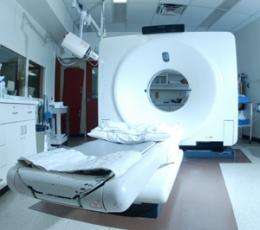CT screening reduces lung-cancer deaths in heavy smokers

(PhysOrg.com) -- Studying heavy smokers, the National Cancer Institute’s 33-center National Lung Screening Trial found that significantly fewer who were screened with low-dose CT scans died from lung cancer than heavy smokers screened with standard chest X-rays.
The study involved more than 53,000 people in the United States, including more than 3,800 participants at the Washington University School of Medicine and Barnes-Jewish Hospital.
David S. Gierada, MD, professor of radiology at the Mallinckrodt Institute of Radiology, directed the study at the Washington University site. He says it already was known that low-dose CT could detect abnormalities in the lung at much earlier stages than a standard X-ray, but until now, it wasn’t known whether using the more sensitive screening technique could help prevent lung cancer deaths. This study, he says, answered that question.
“The patients who were randomized to be screened with the low-radiation dose CT had 20 percent fewer deaths than the group randomly selected to receive chest X-rays,“ Gierada says.
Lung cancer is the No. 1 cancer killer in the United States, claiming more lives than the next three most deadly cancers combined. This year, more than 220,000 people in the United States will be diagnosed with lung cancer, and more than 157,000 will die from the disease.
Smokers in the study had used cigarettes for at least 30 “pack years.” That is, they smoked an average of at least one pack per day for 30 years. They were between 55 and 74 years old when they were enrolled in the study. Subjects received screening exams for three consecutive years during the study.
“It was well-known before the trial even started that CT scans could detect tumors when they were much smaller than can be detected by chest X-ray,” Gierada says. “But what wasn’t known with certainty was whether detecting cancers at that small size would translate into a reduced number of deaths.”
He says one potential drawback to using low-dose CT scans involve false positives. The scans detect a number of abnormalities in the lung that are not cancerous, and when that happens, more extensive follow-up testing is required, which can be expensive, cause anxiety and may, in some cases, even lead to surgical interventions for abnormalities that turn out not to be malignant. But Gierada says in spite of those potential drawbacks, the study clearly demonstrates that low-dose CT screening can reduce the risk of lung-cancer deaths.
“I think the results are pretty clear,” he says.











